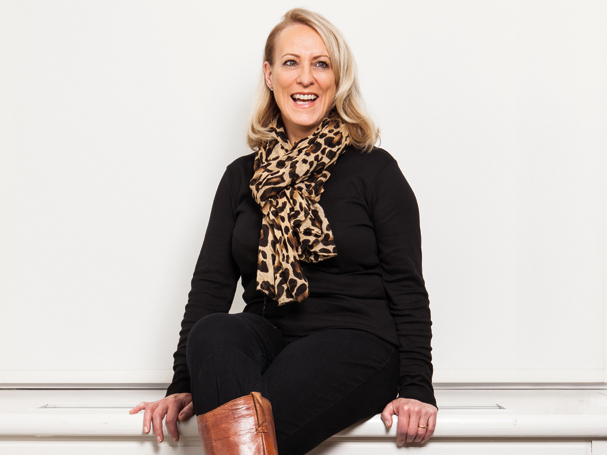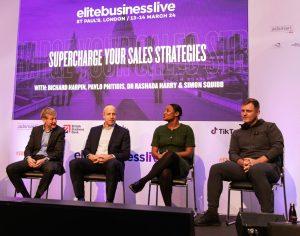As barter company Astus geared itself up for expansion to Australia in 2011, it became apparent that one of the senior management team would need to relocate in the short term. That duty fell to co-founder Frances Dickens. “The trouble with barter is you can’t pick it up quickly,” she says. “We didn’t have anybody in the UK office who didn’t have young kids and who had the level of experience to go out there and open it up.”
She’s right that media barter certainly has its complexities. Put simply, the process means companies can pay for media campaigns (in newspapers, magazines etc) partly in cash and partly in their own products or services. So a car manufacturer may pay 80% in cash but the rest in cars. These products will then be sold on to corporate clients. The media owners are happy because they get new advertisers or additional media spend, while the company has saved itself some cash. Everyone is a winner.
Because it can be a tricky business to explain to new customers, Astus needed a safe pair of hands to spearhead its Australian expansion. In February 2011, Dickens located to Sydney for a year. It’s a common misconception that there won’t be substantive differences in a new market just because it happens to be English-speaking, she explains. “We learned from doing Ireland it’s still a big change from running a successful company somewhere people know how it works versus breaking into a market that’s still suspicious and difficult. It means using the old skills that probably only three of our current management team have got – me, my co-founder ‘Jacko’ [Paul Jackson] and David Jones, our UK MD.”
Eight years after she and Jackson had started the business, she was starting again. “It was really good going back to scratch and doing all the stuff I like doing and doing the presentations for the agencies and clients,” she says. “I worked like an absolute fiend. I was in the office at 7 o’clock in the morning and I left there at 7 o’clock at night when I’d go to my apartment and keep on working.”
There was a method in her madness. “I was working constantly – which probably wasn’t very good health-wise – but I got so much done so quickly because I just wanted to get home. I missed my family horribly.” Dickens had had to leave husband John and son Jack, now 18, behind in Blighty. “I hope I don’t have to do it again,” she adds.
The career that has now taken her to the other side of the planet wasn’t on the cards when she was a youngster. Having harboured dreams of being a three-day event horse rider, she fell into a sales job after leaving school. “I was an absolute disaster in my O-levels; I only passed three. School bored the hell out of me. I was much more interested in learning how to make money and going out and riding horses than actually sitting in lessons.”
She then took a job in life insurance, where she did surprisingly well. “I’m sure it’s much more respectable now but then it was really like the Wild West. I did really well by telling the truth – which was quite an unusual thing for people selling life insurance then.” After a brief stint working alongside James Caan at his newly formed recruitment firm Alexander Mann, Dickens began a career in the outdoor advertising industry – which eventually led her into the world of media barter.

“I went to work for a big American barter company, which was probably not a smart move. I should have done a lot more research than I did because if I had I wouldn’t have taken the job,” laughs Dickens. Before the headhunter had approached her about the role, Dickens had not even heard of barter. “I thought it sounded interesting and quite entrepreneurial.”
Yet within a month, she was beginning to wonder if she’d been handed a poisoned chalice. The saving grace was a relationship she’d begun to form with her colleague and now business partner Jackson. In two years they managed to bolster media placements £4m to £43m in a year.
But while she and Jackson worked hard to restore the reputation of media barter in the UK, the same couldn’t be said of her colleagues. “They over-promised and under-delivered. They got commission on the products so they didn’t care if they could deliver [the returns for the client] or not.” Dickens began considering a new ‘delivery-first’ model – which meant clients would get their media first, then would owe the barter company product – thereby boosting the service the customer received. “Paul and I just thought, ‘we can do this differently,’” she recalls.
Before deciding to go it alone, she initially pitched her idea to her employer. “There was a two-day bank holiday in June and I spent that time in New York, including seven hours in a bloody meeting in a room with no windows, trying to convince the Americans to change their model to go delivery-first,” says Dickens. When they said no, she and Jackson decided to forge ahead.
First things first, they needed capital. This was no mean feat in the barter industry. “It took us ages to get the funding; me and Jacko hiked around everywhere. The biggest problem was getting venture capitalists to understand what we did. The most disheartening day was when we presented to this guy and we thought he got it. At the end he said, ‘I haven’t got a clue but if so-and-so gives you £150,000, I’ll give you £150,000 too.’ We didn’t want money that way: we wanted somebody who really got it.”
Eventually, they managed to find a private investor who ploughed £300,000 into Astus. With Frances’ and Jackson’s contribution and investment from each of the remaining six founding team members, that brought the total kitty to £640,000. It eventually transpired that they didn’t need the safety net – the business generated £6m in revenue in the first year and £3,000 in profit. But Dickens has no regrets: “I don’t think for a minute we would have been nearly as successful if we hadn’t done that. Working in a start-up is tough; you have to work really hard. If you haven’t got a piece of skin in the game I don’t think you ever work in quite the same way as if you have. Even now we have a good share option scheme so everybody has got a piece of the company, no matter how small.”
Little by little, Dickens and Jackson set about changing the perception of the barter industry. “We’d started the process of cleaning it up during our time at [the American company]. We had agencies that trusted us and media owners that saw that we were delivering so it wasn’t as much of a leap as if we’d just gone straight in to try and do Astus.”

Still, it was difficult to make ends meet. “I took an enormous pay cut; it was very tough. I hadn’t juggled money like that since I was a teenager,” she exclaims. By this point, son Jack was in a prep school and fees needed to be paid. “Luckily, my husband was working so he took on the lion’s share of paying for everything. It was very tight.”
The company grew quickly. In month three, it signed its first big client: Mercedes. In year two, it doubled revenues to £12m. In year three, it doubled them again to £22m. Dickens says the secret to their success is the company’s ethics. “We drew up a charter about how we would conduct ourselves as a company both externally and internally. This included things such as we’d not sign a client without their agency knowing about it. We won’t sign a deal we can’t deliver. And one of my personal bugbears was when companies spend so much on entertaining and then people don’t bother to show up; it used to really annoy me. So one of the things I put on there was, ‘if you’re invited to something and you accept it, you will go’”.
When she overheard one of her employees (who no longer works for Astus) saying he wasn’t going to attend a hospitality day clay pigeon shooting the next day, she went in his place. “I was stood there in the car park in my jeans and Timberlands and there’s all these guys with all the gear and their guns and I’m thinking, ‘Oh for God’s sake’. But I bloody loved it.” And so began her love affair with clay pigeon shooting – which has since come to replace horse riding as her hobby of choice. “I’m just too broken to risk falling off,” Dickens explains.
It’s just as well she has plenty to keep her occupied at the office then. One current challenge is trying to find new office space for Astus’s 32 UK-based staff. To upsize within Victoria, London, where they currently are, they’re looking at rent and rates amounting to £500,000 a year. “It’s mad money.” But she’s reluctant to uproot the team. “I don’t want to move and find we lose members of the team because their journey becomes a pain in the backside. It’s a real dilemma – and a time-consuming one at that,” she adds.
She has the company’s ever-expanding global portfolio of clients to attend to, too. Astus is beginning to pick up more custom in Asia and, although it now has staff in Singapore and Shanghai, Dickens still travels to the area regularly to check things are progressing nicely. She also has a couple of lengthy trips to Australia a year.
But nowadays she no longer travels solo. “John comes with me. Having had that year apart, I just said: ‘that’s it.’ We have to pay for his flights ourselves, which makes it quite expensive, but he loves all the places I go and it just makes it a bit nicer.” It also means she doesn’t rush back. “We’re about to go to Australia for a month: I’ll work three weeks of that and have a week off in the middle. To be honest, if John wasn’t travelling with me, I’d probably have wanted to come back after two weeks.”
John isn’t the only man in her life. There’s son Jack, who has just scored a place at the University of Cambridge. And let’s not forget Jackson. Dickens says the best decision she ever made was going into business with him. “He does the numbers, I do the words. We actually fit really well. I love him to bits; he’s my best mate.” That’s not to say they don’t drive one another to distraction sometimes. “In the early days, we’d go out in the street to shout at each other because we didn’t have a boardroom to start with,” she smiles. “I’m not very good a sulking though so it doesn’t last very long. I do remember getting annoyed at him about something and we had to go and do a big presentation at Sky. We were walking down there and I wasn’t speaking to him. He said: ‘You’re sulking but I know you – you’ll have forgotten you’re sulking by the time we get to Sky.’ He was right.” ![]()
Share via:


















































